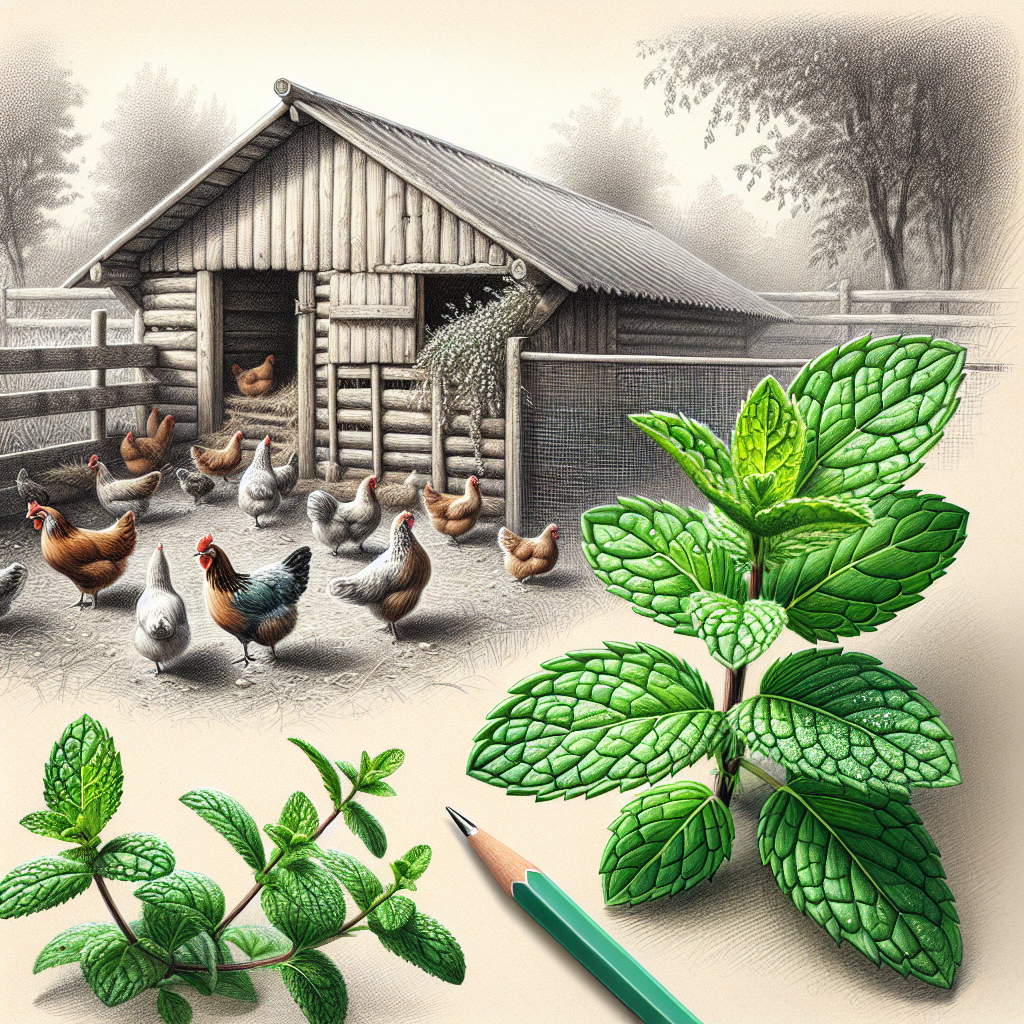Are pesky pests and bothersome mites causing havoc in your chicken coop? Fear not, for there are natural solutions that can come to your rescue! Keeping your feathered friends safe and comfortable is a top priority, and in this article, we’ll explore some ingenious ways you can protect your coop from these unwelcome invaders. From aromatic herbs to diatomaceous earth, we’ll uncover the secrets to creating a pest-free sanctuary for your beloved chickens. So gather ’round, dear chicken keepers, and let’s embark on a mission to banish those pests forever!
Introduction
Keeping your chicken coop clean and free from pests and mites is essential for the health and well-being of your feathered friends. Not only do these pesky intruders affect the comfort of your chickens, but they can also spread diseases and cause harm. Fortunately, there are several natural solutions you can implement to ensure a clean and pest-free environment for your chickens. In this article, we will explore various methods and techniques you can employ to maintain cleanliness in the chicken coop, deter pests and mites, and create a harmonious living space for your flock.
Maintaining cleanliness in the chicken coop
Regularly cleaning and disinfecting the coop
Cleaning and disinfecting the chicken coop regularly is crucial to prevent the accumulation of dirt, bacteria, and parasites. Start by removing all the bedding material and thoroughly scrubbing the surfaces, including the walls, nesting boxes, and perches. Opt for natural cleaning agents like vinegar solutions, which are effective in eliminating bacteria and odors without the use of harsh chemicals. After cleaning, allow the coop to dry completely before adding fresh bedding.
Removing debris and organic matter
One of the key factors attracting pests and mites to the chicken coop is the presence of debris and organic matter. Regularly inspect and remove any fallen leaves, straw, or food scraps that may have accumulated in and around the coop. By keeping the area free from clutter, you discourage pests from finding a place to hide and reproduce.
Proper waste management
Proper waste management is essential to prevent the attraction of pests and mites. Ensure there is a designated area for disposing of chicken waste, such as a compost bin located away from the coop. Regularly clean and remove accumulated droppings from the coop floor, as they can become a breeding ground for pests. Additionally, consider using deep litter systems or sand bedding, which can help control odor and minimize the risk of pests.
Using herbs and plants as natural repellents
Planting mint around the coop
Mint is not only a refreshing herb for humans, but it also acts as a natural deterrent for pests and mites. Planting mint around the chicken coop can help repel insects such as ants, fleas, and ticks. The strong aroma of mint leaves acts as a natural barrier, keeping unwanted visitors at bay. Consider planting mint in pots or a designated area near the coop, and ensure that you trim and harvest the leaves regularly to maintain its effectiveness.
Utilizing lavender for its insect-repellent properties
Lavender is well-known for its calming scent, but it also possesses insect-repellent properties. By planting lavender near the chicken coop, you can help deter common pests such as flies and mosquitoes. The aromatic oils present in lavender act as a natural deterrent, making it an excellent addition to your chicken coop garden. Additionally, dried lavender can be hung in the coop or placed in nesting boxes to provide a calming environment for your chickens and discourage mites from infesting their resting areas.
Growing marigolds to deter pests
Marigolds are not only beautiful flowers but also effective in deterring pests from the chicken coop. The distinct scent of marigolds repels a wide range of insects, including aphids, flies, and nematodes. Planting marigolds around the coop perimeter creates a natural barrier that helps keep unwanted pests away from your chickens. Moreover, marigolds are easy to grow, making them a low-maintenance and cost-effective addition to your coop’s pest control strategy.
Using garlic as a natural insecticide
Garlic is not only a staple in many kitchens but also an excellent natural insecticide. Its pungent smell repels pests and mites, making it a valuable addition to your chicken coop. You can crush garlic cloves and mix them with water to create an organic spray. Apply this mixture around the coop and on the chickens’ perches and roosting areas. Not only will it help repel pests, but garlic also possesses antimicrobial properties that can benefit your chickens’ overall health.
Implementing natural predators
Attracting beneficial birds to the area
One effective way to control pests and mites in your chicken coop is by attracting beneficial birds to the vicinity. Birds such as swallows, wrens, and bluebirds are natural predators of insects and can help keep populations under control. You can encourage these birds to visit your coop by providing nesting boxes or birdhouses nearby. Additionally, planting trees and shrubs that produce berries or seeds can further entice these helpful feathered friends.
Introducing beneficial insects
Introducing beneficial insects into your chicken coop environment can help control pests naturally. Ladybugs, for example, feed on aphids and other harmful insects, while predator mites prey on destructive mites. You can purchase these beneficial insects from garden centers or online suppliers and release them into the coop and surrounding garden areas. By maintaining a balance of helpful insects, you create a natural ecosystem that keeps pests in check.
Utilizing predator animals
Certain animals can be employed as natural predators to control pests and mites in the chicken coop. For example, guinea fowl are known to be excellent pest hunters, feeding on insects, ticks, and even small rodents. By introducing guinea fowl to your flock, you not only benefit from their pest control capabilities but also gain an entertaining addition to your coop. Just ensure that you provide adequate shelter and protection for the guinea fowl to ensure their safety during the night.
Creating physical barriers
Installing wire meshes and fences
Creating physical barriers is an effective strategy to prevent pests and mites from accessing the coop. Install wire meshes around the coop perimeter, ensuring that the holes are small enough to keep out rodents and insects. Cover windows and ventilation openings with fine mesh screens to prevent unwanted entry. Additionally, consider erecting a fence around the chicken run area to provide an extra layer of protection.
Sealing cracks and gaps in the coop
Inspect the chicken coop regularly for any cracks or gaps that may serve as entry points for pests and mites. Repair and seal these openings using caulk or silicone to prevent any unwanted intruders from entering. Pay close attention to areas where the coop meets the ground or where different materials join, as these are common places for pests to gain access.
Using sticky traps or barriers
Sticky traps or barriers can be effective in catching and detaining pests that may have found their way into the coop. Place sticky traps near potential entry points or areas where pests are commonly seen. These traps will help capture insects and prevent further breeding. However, be cautious when using sticky traps to avoid accidentally trapping beneficial insects or birds.
Applying diatomaceous earth
Understanding the benefits of diatomaceous earth
Diatomaceous earth is a natural substance made from fossilized remains of microscopic algae. It is an effective tool in deterring pests and mites due to its abrasive texture, which damages the exoskeletons of insects and causes them to dehydrate and die. Additionally, diatomaceous earth is safe to use around chickens and has no harmful effects on their health when used correctly.
Applying diatomaceous earth in the coop and surrounding areas
To utilize diatomaceous earth in your chicken coop, sprinkle a thin layer around the coop floor and nesting areas. Pay special attention to areas where pests are commonly found, such as roosting bars and cracks. You can also apply diatomaceous earth around the perimeter of the coop to create a barrier that pests are reluctant to cross. Remember to reapply after rain or excessive moisture to maintain its effectiveness.
Making use of essential oils
Using citronella oil as a natural repellent
Citronella oil is well-known for its ability to repel insects, including mosquitoes and flies. By adding a few drops of citronella oil to a spray bottle filled with water, you can create a natural repellent for use in and around the chicken coop. Spray the solution in areas where pests are likely to gather, or mist it onto your chickens’ feathers to discourage mites from infesting them. However, ensure that you dilute the citronella oil properly and avoid spraying directly on the chickens’ faces.
Applying neem oil for pest control
Neem oil, derived from the neem tree, is an effective organic solution for pest control. It acts as an insect growth regulator, disrupting the life cycle of pests and preventing them from reproducing. Dilute neem oil with water and spray it on the coop walls, perches, and nesting areas to deter pests and mites. Neem oil is also safe for chickens when used in moderation, making it a fantastic natural alternative to chemical-based pesticides.
Using eucalyptus oil to repel mites
Eucalyptus oil has been used traditionally to repel mites and other pests. Its strong scent acts as a deterrent, protecting your chickens from infestations. Mix a few drops of eucalyptus oil with water and spray the solution around the coop and on the chickens’ roosting areas. As with other essential oils, it is important to dilute eucalyptus oil properly and avoid contact with the chickens’ eyes or sensitive areas.
Utilizing tea tree oil for its antimicrobial properties
Tea tree oil is renowned for its antimicrobial properties, making it an excellent addition to your coop cleaning routine. Mix a few drops of tea tree oil with water and use the solution to wipe down surfaces in the coop, including perches, nesting boxes, and floors. Tea tree oil not only helps keep the coop clean and free from bacteria but also acts as a deterrent for pests and mites.
Ensuring proper ventilation
Implementing proper airflow in the coop
Proper ventilation is crucial for maintaining a healthy chicken coop environment. Good airflow helps remove moisture, reduce ammonia levels, and prevent the buildup of odors. Ensure your coop has adequate windows or vents that can be opened and closed to provide optimal airflow. Installing exhaust fans or solar-powered ventilation systems can also help regulate air circulation in the coop.
Installing ventilation systems
In addition to natural ventilation, you can enhance airflow in the chicken coop by installing ventilation systems. Exhaust fans or solar-powered ventilation systems can help remove stale air and excess moisture, creating a healthier environment for your chickens. These systems can be particularly beneficial during hot and humid climates, reducing the risk of heat stress and preventing the growth of mold or mildew.
Using natural materials for insulation
Insulation is another important aspect of maintaining proper ventilation in the chicken coop. Using natural materials such as straw, hay, or wood shavings can help regulate temperature and moisture levels, creating a comfortable and healthy environment for your chickens. Ensure that the insulation materials are regularly replaced or cleaned to prevent the accumulation of dust or pests.
Employing natural cleaning agents
Using vinegar solutions for cleaning
Vinegar is a versatile and natural cleaning agent that can effectively eliminate bacteria and odors in the chicken coop. Mix equal parts of water and vinegar to create a cleaning solution. Use this mixture to scrub surfaces, remove stains, and sanitize chicken feeders and waterers. Vinegar is safe for your chickens and does not leave behind any harmful residues.
Utilizing lemon juice as a natural disinfectant
Lemon juice is not only refreshing but also acts as a natural disinfectant due to its acidic properties. Mix lemon juice with water and spray it on surfaces to kill bacteria and sanitize the coop area. Lemon juice is particularly effective in removing stubborn stains and odors. Its fresh scent also helps create a pleasant environment for your chickens.
Making use of hydrogen peroxide for sanitization
Hydrogen peroxide is a powerful yet environmentally friendly cleaning agent that can be used to sanitize the chicken coop. Dilute hydrogen peroxide with water and use it to clean and disinfect surfaces, equipment, and feeding areas. It effectively kills bacteria, viruses, and fungi, making it an excellent choice for maintaining a clean and healthy coop environment. However, be cautious not to expose your chickens to concentrated hydrogen peroxide, as it can be harmful to them.
Conclusion
Maintaining cleanliness in the chicken coop and deterring pests and mites are vital for the health and well-being of your feathered friends. By regularly cleaning and disinfecting the coop, removing debris and organic matter, implementing natural repellents, employing natural predators, creating physical barriers, applying diatomaceous earth, using essential oils, ensuring proper ventilation, and employing natural cleaning agents, you can create a safe and harmonious environment for your chickens. With these natural solutions at your disposal, you can enjoy the benefits of a clean and pest-free chicken coop while keeping your chickens happy and healthy.




